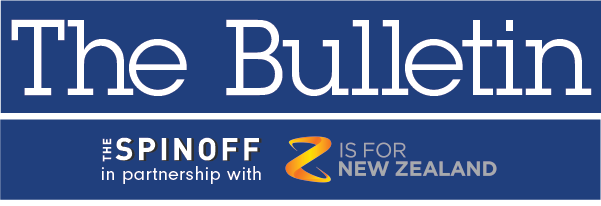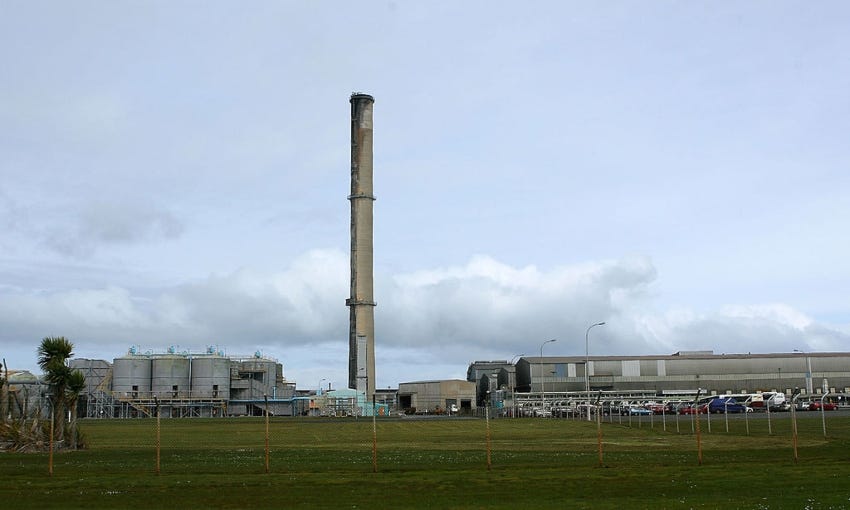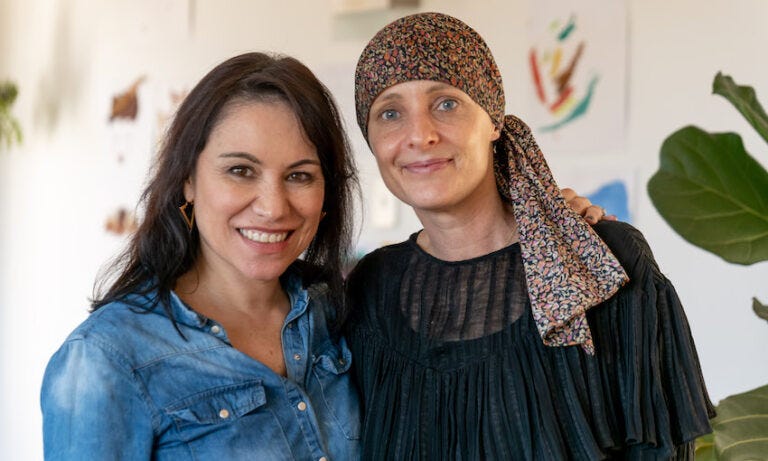Tiwai Point closing affects everything
It's a direct blow for the people of Southland, but the story has implications for the whole country

Good morning and welcome to The Bulletin for Friday 10 July, by Alex Braae for The Spinoff. Presented in partnership with Z Energy.
In today’s edition: Major implications from Tiwai Pt closure, diplomatic rift over Hong Kong deepens, and grim new approach to managed isolation.

Image: Tiwai Point in Southland (Getty Images)
The story of Rio Tinto pulling out of the Tiwai Point smelter is one that shows the deep connections between regional stories and the rest of New Zealand. Michael Andrew looked at the complex strands of the issue yesterday, and it's a great starting point if you're new to the story. For today's Bulletin, we'll pick up on some of the developments and what they could mean.
First of all, it's an economic tragedy for the people of Southland. That much is undeniable, because the smelter provided good, high-paying jobs, which are really not easy to come by in a lot of the country. The ODT reports this morning that local business leaders are terrified of what comes next, and Great South chief executive Graham Budd put it bluntly but accurately when he said "there won't be anybody across Invercargill and the region that hasn’t been touched in some way directly or indirectly by this." That group has vowed to fight on to try and save the smelter.
It seems likely this time to be a lost cause. Rio Tinto, widely regarded as a terrible corporate citizen around the world, have spent years cynically using the prospect of the region's economy being shattered to force concessions out of government. When the Key government bailed the smelter out last time, they made it clear that it would be the last time. And the current government have stuck to that. Finance minister Grant Robertson and economic development minister Megan Woods issued a statement that made it clear the rest of the country will no longer subsidise the smelter.
So what should those people in Southland do instead? They'd be forgiven for not feeling super confident about the future when the statement addressed that as follows: "We know the strengths of Southland and we want to build on them in areas such as agriculture, aquaculture and manufacturing. There is also an opportunity to support other energy intensive projects like green hydrogen and data centres." Woods stressed that there was more than a year to go before the smelter fully closed, so there would be time to put some actual detail on the table – but a year can go by very quickly, and it seems certain that many won't have jobs to step into when their existing one goes.
There will also be big implications for electricity generation. Business Desk's (paywalled) Dan Brunskill has looked at the sharemarket impact on the gentailers (big power companies that generate as well as retail) and they've seen billions in value wiped away. Tiwai Point used between 10%-15% of the country's total electricity supply in any given year, so now some will be expecting lower prices. But it won't necessarily flow simply like that, because of the transmission costs to get that power from the hydro dams in the deep South up to population centres in the North Island. There was a really interesting piece on Politik this morning about transmission pricing itself, and how decisions made several years ago to keep costs down for Aucklanders effectively sealed the fate of Tiwai Point yesterday.
There will now be a glut of clean renewable energy on the market, so what should be done with it? Nikki Mandow at Newsroom has looked into how this is likely to have a positive impact on the country's carbon emissions – both directly from the smelter itself, and less directly because it dramatically reduces the need for fossil fuel plants to stay open to provide overflow power supply. But it won't happen overnight, because of various infrastructure challenges. If the power supply isn't needed any more, it could also have positive implications for the Waiau River, which campaigners say has been degraded by the presence of the Manapouri Dam.
Just quickly, a message from The Spinoff's managing editor Duncan Greive:
"The arrival of Covid-19 and lockdown changed The Spinoff, transforming our editorial to focus on the biggest story of our lives, taking a small team and making it a seven day a week news operation. But it also fundamentally changed us as a business, too. Prior to the crisis, around 20% of our editorial costs were funded by our Members. Now, that figure is north of 50%. If you're already a member, please know that all at The Spinoff are incredibly grateful for your help. If you're not, and would like to contribute, please consider doing so – support is important to our ability to cover the next phase of the crisis, in all its complexity."
The diplomatic rift between China and the Five Eyes alliance over Hong Kong has deepened, and New Zealand is very much a part of it. Radio NZ reports MFAT will be "reviewing the settings of its relationship" with Hong Kong, after a draconian new security law was put in place, which heavily cracks down on a lot of freedoms previously enjoyed by people of the city. People aren't really travelling at the moment anyway, but the advisory warning for New Zealanders has been updated to say that there is now an increased risk of arrest and prosecution on a wide range of grounds. It follows similar moves from Australia, which has also decided to suspend its extradition agreement with China.
Police will now guard managed isolation hotels to prevent guests from going walkabout, along with other beefed up security protocols in place. Our live blog has the details, including a grim new realness in the way the government will approach the facilities – “the facilities are a snapshot of society and there will inevitably be the odd problem. We must ensure our security arrangements anticipate the type of behaviour we’re seeing from the worst of our returnees,” said minister Megan Woods. Also included in our live blog is an update with Countdown, who have issued a clarification of details around the trip the escapee made to their supermarket.
Speaking of that guy, the NZ Herald's Anna Leask managed to get hold of him for an interview. He has questioned the police's version of events, but refused to say why he left the hotel, or whether he felt he had put the public in danger by his trip.
On a semi-related note, a judge has issued a warning to the government on the legality of banning compassionate exemptions, reports Newshub. It follows the case of a man who tried to see his dying father, but wasn't able to make it in time because of legal holdups. A few weeks ago professor Andrew Geddis predicted a similar outcome to this, were it to be tested in court – and now Justice Muir of the Auckland High Court says there is an urgent need for the director-general of health to address the terms of the order.
Like pretty much every major party going into an election these days, National released an economic framework yesterday which read like five nice bullet points scrawled on a napkin. So we won't bother focusing on that – instead, I'd encourage you to read this from Stuff's Thomas Coughlan that went deep into a wonkish but highly consequential aspect of how the party would govern under Todd Muller. It concerns two pieces of legislation – the Public Finance Act and the Fiscal Responsibility Act, and where National is looking to position itself in relation to previous National governments. Of particular note is the discussion around net debt to GDP, alongside promises to spend up large on infrastructure. There's much more to it than the bullet points would suggest.
Occasionally I share pieces I really don't agree with, but think are important to give people the chance to read all the same. So in the spirit of that, here's an op-ed on Al-Jazeera by journalist Glen Johnson, who argues that "New Zealand's media endangered public health" in their coverage of Covid-19. His argument hinges on a few points, but mostly it comes back to the idea that media have been more interested in scalps, sensationalism and ratings than the public interest. As I say, I strongly disagree with that assessment, and for a counterpoint, here's a recent piece from Mediawatch's Hayden Donnell, who argues that media scrutiny and pressure in fact helped save lives.
NZ First leader Winston Peters has taken unexpected medical leave for a surgical procedure, after experiencing symptoms of food poisoning and dehydration earlier in the week. In a release, he said he was confident of a quick return to work, and being "fighting fit for the election campaign, which is typically physically gruelling.” It means that there has been a shuffling of campaign events for the party, with the launch pushed back to next weekend rather than this weekend. We're wishing him all the best on a speedy recovery.
Got some feedback about The Bulletin, or anything in the news?
Drop us a line at thebulletin@thespinoff.co.nz

Right now on The Spinoff: Joe Nunweek writes from Melbourne about the mood in the city going into a second, six week long lockdown. Stacey Morrison talks to Chloe Irvine about life with breast cancer through Covid-19. Historian Scott Hamilton tells the stories of four remarkable Pākehā, who deserve statues but were vilified in their time for the moral stands they took. Mary Jo Vergara looks at the spending sugar rush in the economy right now, and whether it will continue to last.
And in music: There's a brand new edition of The Side Eye, meeting band The Beths and getting a sense of how Covid has reshaped everything for them. And Duncan Greive has met emerging artist Deryk, who seems to be on the sort of trajectory that by the end of the year she'll be a star.
For a feature today, a longread about an artistic medium which can be used in very interesting ways by skilled practitioners. Nathan Joe at the Pantograph Punch has written about radio plays, and the curious form of intimacy they can create with audiences. Here's an excerpt where this idea is explored.
It’s one of the great ironies that our ears can paint a much more vivid picture of moments like these than our eyes can. The sound of water conjures up the sea with far smoother suspension of disbelief than even the most talented physical theatre-makers could elicit with the finest materials.
Radio need not apologise for its limitations of budget or the absence of visual signifiers. The mind’s eye can be as visually extravagant as it wants to be, a complicit co-author to the playwright. Radio has always been, even more than the stage, a writer’s medium.
A fascinating sports story that hasn't really been covered much in The Bulletin is what's currently going on with the Black Sticks hockey team. The NZ Herald's Dylan Cleaver has been chipping away at it, noting the string of departures and reporting on rumours around deep unhappiness within the High Performance programme. At the start of the week, a statement came out from Hockey NZ, which Radio NZ reported on. It denied speculation that there had been a falling out between coaching staff, particularly with the recently resigned assistant coach Katie Glynn.
That's it for The Bulletin. If you want to support the work we do at The Spinoff, please check out our membership programme




